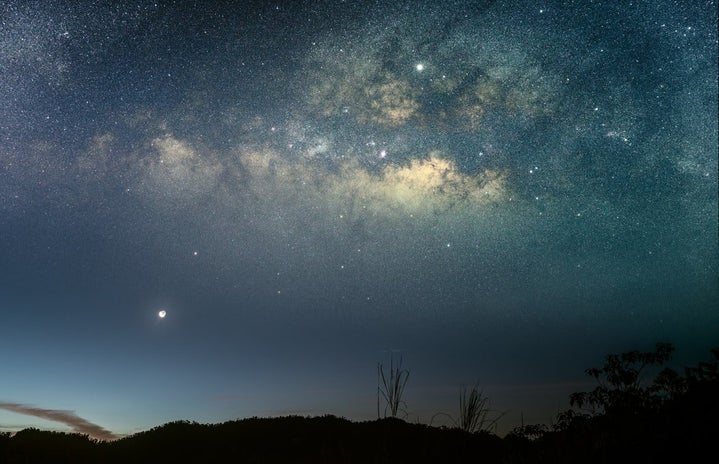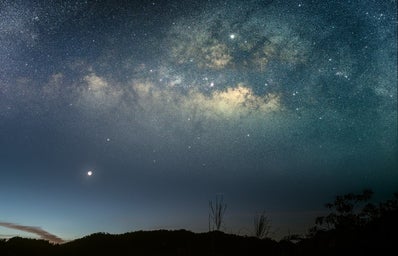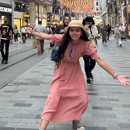Ramadan is a period over roughly a month where Muslims are fasting (sawm) from sunrise to sunset. It is an obligation all Muslims must fulfill, because it is the fourth pillar of Islam.
Fasting in this case means abstaining from food and water. But it is not just about avoiding food for 12-18 hours a day. The purpose of fasting is to get closer to God by focusing on spirituality and to be thankful for your blessings, since not everyone gets to have a warm meal. In addition to all this, Ramadan teaches self-control, because getting food or drinking water is very tempting.
People also abstain from activities such as sexual intercourse during fasting, but these restrictions are lifted in between the period from sunset to sunrise. Meanwhile, people are discouraged from vulgar behavior such as swearing and backbiting.
Instead, people do acts of kindness, such as giving donations, praying at the masjid, or providing iftar meals for the less fortunate. Even small acts of kindness, such as greeting others (salam) counts! It is said that the reward of the good deed is 70 times higher than an average day.
When is ramadan?
Ramadan itself is the holiest month of the Islamic Calendar, which varies differently from the standard Julian Calendar. That is because many calendars revolve around the sun, but the Islamic Calendar revolves around the moon.
This makes it a little hard to pinpoint when Ramadan starts. People do not know exactly when it starts until only a few days before, beginning with moon sighting (that is, when a crescent forms). This year, it will fall on the evening of March 10, and fasting begins the following day on March 11.
Because the Islamic Calendar runs on a different cycle, Ramadan can happen in any month, like July or December. However, there is a pattern that Ramadan is roughly 10 days earlier than it was the year before. For example, Ramadan last year was around March 22.
Ramadan is holy because Muslims believe many things were revealed from God (also known as Allah), one of which being the Quran (our holy book) being introduced in that month.
what happens on a day in ramadan?
People will get up sometime really late at night to have a meal called Suhoor. It is supposed to be a light meal, but also hold you over until you break your fast hours later. Fasting officially starts when it is time for the dawn prayer, Fajr.
Most people would go back to bed after the prayer and continue on with their day after they wake up in the morning. Nothing new happens, except there is no traditional breakfast or lunch. If you live in a Muslim-majority country, people may get out of work/school early to accommodate fasting.
When sunset gets here, you can finally eat and drink. This meal is much larger, called Iftar (literally means breakfast in Arabic). People usually say a small dua (invocation) to thank Allah for His blessings, that you have food, a house, loved ones, etc.
People would pray the Maghrib (dusk) prayer either before or after eating. People can do an extra prayer called Tarawih, but it is optional.
There is not much to it, and the cycle repeats again.
Iftar meals
Iftar is a huge deal for Muslim families. People love hosting and inviting their friends and family! There is a theme with Iftar meals: lamb is one of the most common meats. People even give away food to the needy as a good deed. A Ramadan staple is dates. A lot of times, most people break their fast by eating a date, because that is how the Prophet Muhammad (peace be upon him) would break his fast.
There are also common drinks, such as Qamar Al Deen (apricot juice) and Sobia (coconut milk). Obviously they can be consumed at any time, but Ramadan is the peak season.
Depending on where you are from, families base their meals off their cultural dishes. A lot of times, this includes Middle Eastern cuisine. Or sometimes food from South Asia. But this is different for someone who is from Malaysia, for example.
decor
Many people decorate their homes for Ramadan. As an Egyptian, there are distinct Ramadan decorations our family uses. First, there is a specific red tablecloth with geometric patterns on them, called a khayamiya. Second, there is the fanoos, a special lantern that goes back to times when people used them to light the way to the mosque. The fanoos is my favorite. It has become very widespread in other Muslim countries as a famous Ramadan decoration!
who can fast?
Anyone can! Fasting is not exclusive. Even non-Muslims are welcome to participate. People start fasting once they hit puberty, but people younger than that can practice fasting for a shorter amount of time. The only ones who are not allowed to fast are those who are:
- Not in good health
- Old
- Pregnant
- Menstruating
- Sick
- Traveling
Ramadan is much more flexible than you think. You are free to skip fasting days, only if it is absolutely necessary. However, you must make up for those days later. Many people make up fasts in the winter because those days are shorter, hence, shorter fasting times.
why is fasting beneficial?
Fasting has been proven to have numerous benefits, including the support of metabolism and heart health. However, these facts come from intermittent fasting, which is a period of time when people fast after dinner and do not eat anything until the next morning.
As I mentioned before, fasting reminds me of my priorities and what I take for granted. For example, I am lucky to have meal swipes or order food from DoorDash, but getting food can be hard for some people, so I put myself in other people’s shoes by seeing what it’s like to go without food.
Realistically, eating takes up some time. When I fast, I get to wake up later because I do not worry about getting breakfast before class. I think this works in my favor because I am by no means a morning person. Also, the time I spend eating could be used instead to catch up on classwork. It feels good to have one less thing off my plate because I am always walking around campus.
At the end of the day, when I finally eat again, it feels great! I got a good meal in because I craved all the food and my body is happy again.
laylat al-qadr
Laylat Al-Qadr (the night of power) is the best night in Ramadan! On this day, Muslims believe that all their prayers will be accepted, no matter what. People make these prayers during Fajr, because it is the prayer that is the most important anyway.
Yet, there is an eternal mystery. We never truly know when Laylat-Al-Qadr occurs. We do know though that it is a day during the last 10 days of Ramadan. We also know that it is an odd day, meaning the 21st, 23rd, 25th, 27th or 29th day of Ramadan. Just to be safe, people would make these special prayers on all of those days. That way, it is guaranteed that one of those days is Laylat Al-Qadr.
what happens next?
Eid Al-Fitr! This literally means “festival of breaking the fast” and it is very self explanatory. This is one of Islam’s most important holidays, which lasts for three days. This year, it will start roughly immediately after the last fasting period (April 9) but the real festivities begin the following day (April 10). People celebrate by going to pray together, hanging out with loved ones, and wearing brand new clothes. These are only a few practices though.
representation matters!
When I was growing up, I would see celebrations for other religions like Easter and Hanukkah. From TV shows to books to dolls, it seemed that only Christian and Jewish characters and holidays were the most widespread. And there was nothing wrong with that! I just felt like I could not personally relate to some of these topics.
When I saw a book about an Egyptian boy celebrating Ramadan at my local Target, I went ballistic! For once, I understood everything the boy was doing, from the fanoos he was hanging up to the treats he made for his class, I could relate. The fact that he was Egyptian and Muslim was the perfect representation of me. I think this is a fabulous start to inclusivity, and I have a feeling that it will get better.
To all fellow Muslims, and non-Muslims too, I want to wish you a Ramadan Kareem (blessed Ramadan)!


